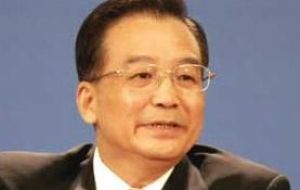MercoPress. South Atlantic News Agency
Corruption and inflation, main challenges to social stability admits China
 Premier Wen Jibao, gradual political reforms under the one party rule
Premier Wen Jibao, gradual political reforms under the one party rule Premier Wen Jiabao said on Monday China would pursue political reforms only in a “gradual” manner and within the umbrella of one-party rule, even as he ruled out the likelihood of the recent West Asian uprisings having any impact on China.
Mr. Wen identified corruption and inflation as the two biggest challenges to social stability, acknowledging that the Chinese government would require “political restructuring” to address these issues.
“I believe reform is an eternal theme of history. Political restructuring and economic restructuring should be advanced in a coordinated way,” Mr. Wen said, speaking to reporters following the conclusion of the 10-day annual session of the National People’s Congress (NPC), China’s top legislative body.
“Nothing in this world stays immutable, and it is only with reform that we can ensure continuous existence and growth,” he said. “Political restructuring offers a guarantee for our economic restructuring endeavor. Without political restructuring, economic restructuring would not succeed, and the achievements we have made…may be lost.”
Mr. Wen has, over the past 18 months, stirred debate with strong calls for political restructuring, seen by some as an attempt to push forward political reforms in China. On Monday, however, the Premier made clear that rather than political rights, the reforms he had in mind emphasized promoting fairness in income distribution, narrowing disparities and expanding access to educational, medical and health services.
This week, the NPC approved the outline for China’s next Five-Year Plan (2011-15), which Mr. Wen said would place top priority on controlling inflation and transforming China’s pattern of development.
Mr. Wen said the government set a lower 7% annual growth target for the next five years in an effort to curb rising prices, place greater emphasis on “a good quality of economic development” and expand social services.
“Inflation is having a big impact on China,” he said. “Inflation is like a tiger. Once it gets free, it is difficult to put back in the cage.”
The next Five-Year Plan, he said, would place greater emphasis on sustainable growth, as well as ensure that the evaluation of officials “would not only take into account economic indicators but more coordinated economic and social development and whether social justice has been promoted.”
The Chinese Premier identified corruption as “the biggest danger” to his government. “To eliminate the breeding ground of corruption, we should pursue institutional reforms,” he said. “If we are to address the people’s grievances and meet their wishes, we must create conditions for the people to criticize and supervise the government.”
He said China would follow a “gradual” and “step-by-step” approach to expand “self-administration” by the people, without specifying a time-frame. China has introduced village-level elections in some countries, as well as indirect elections at the city-level.
“We should believe that when the people are capable of running village affairs well, they will also be capable to move from running affairs of a village, to affairs of the township, and then the county. That will be a gradual process,” he said. Any political reforms, he stressed, would be taken forward “in an orderly way and under the leadership of the party.”
Mr. Wen also ruled out the possibility of the unrest in West Asia impacting China, after online calls for a Tunisia-inspired “Jasmine Revolution” in China prompted a tightening of security in recent weeks, even as protesters failed to respond to the calls.
“We have followed closely the turbulence in the political situation in some West Asian and North African countries,” Mr. Wen said. “At the same time, we take the view that it is not right to draw an analogy between China and those relevant countries.”
Following three decades of rapid economic growth, he said “the Chinese people have seen that the Chinese government is taking serious steps to address the challenges and problems in China’s economic and social development.




Top Comments
Disclaimer & comment rulesCommenting for this story is now closed.
If you have a Facebook account, become a fan and comment on our Facebook Page!